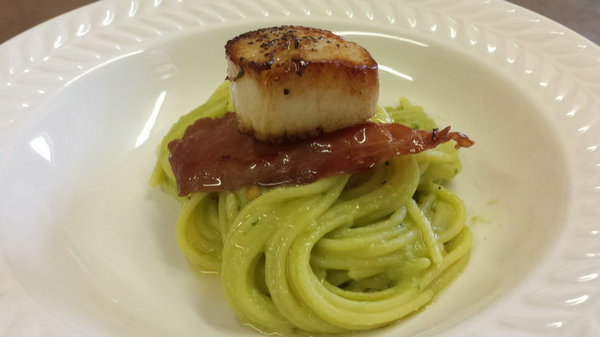Pride of plate
Updated: 2016-04-01 08:48
By Mike Peters(China Daily)
|
|||||||||
 |
|
Fresh ingredients are crucial for such dishes as basil pasta with scallop, veal with roasted fennel, and brodetto (a seafood stew).[Photo provided to China Daily] |
The bio on Potenza's website notes that he came to the United States at the age of 19, to live with his family and study history at Rhode Island College. As he tells the story by phone today from his home in New England, the tale is a bit more complicated.
"I got suspended from school in Italy - I was kind of a rebel," he muses. "Those were the days of the Red Brigades, and then I decided to enroll in the youth wing of the Italian communist party. My father was a commander in the Italian army, and he was one of the founders of a monarchist party, so I was in a family of politicians. To have the eldest son joining the communist youth movement was a tragedy for my father."
He went to the US for a fresh start with family in Virginia, playing professional soccer - "making no money at that" - and studying history.
"I wound up spending a lot of time in the family kitchen, as Italians do," he laughs. "I became a college professor of Western civilization, and that led me to the history of food. Research gave me an ability to understand the food of different nations, especially Italy, and since then I have dedicated my life to it."
In fact, while Potenza has won plenty of awards for innovation, the one-time rebel has become a champion of his culinary tradition.
While proper ingredients are more readily available now, Potenza says the power of international franchises makes his mission to share Italy's diversity "increasingly very hard".
He's all but declared war on The Olive Garden, a huge chain of Italian eateries in the US that he says now "controls the mid-American market to define what is Italian food". And while his name has gleamed atop a series of acclaimed restaurants in Rhode Island and in Italy, he's most proud to be an educator, launching a cooking school and culinary travel tours designed to showcase his country's culinary diversity.
"We've only had tomatoes for about 200 years - we didn't starve before that," he says, chuckling. "And there are lots of other myths: People think Italians eat mozzarella every day and bathe in olive oil!
Related Stories
My first encounter with Chengdu cuisine 2016-02-04 15:11
Famous Spanish chef embraces Chinese cuisine 2016-03-04 08:37
Hottest cuisine contest KO coldest windy weather 2016-01-25 13:50
Italian chefs celebrate cuisine with veal cutlet 2016-01-15 08:05
Enjoy Shanghai cuisine at Tianma Country Club 2015-12-21 10:15
Today's Top News
A fresh start
Bookshops reinvent themselves
Xi-Obama bilateral talk to advance ties
Foreign companies reassured on new Internet rules
Beijing and Prague form new key link
Trump drops pledge to back Republican nominee
China, Czech Republic set up strategic partnership
EgyptAir hijacker arrested, all passengers freed
Hot Topics
Lunar probe , China growth forecasts, Emission rules get tougher, China seen through 'colored lens', International board,
Editor's Picks

|

|

|

|

|

|






